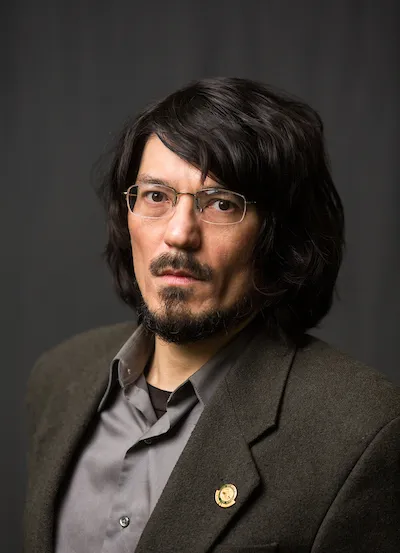Northern Michigan University associate professor Jeffrey Horn has been awarded $92,500 from the Michigan Translational Research and Commercialization (MTRAC) Innovation Hub for Advanced Computing for a next-generation computing project. Horn received the funding for a Deep-Scale Evolution (DSE) algorithm that he invented that has practical implications for minimizing material waste in industrial production.
“We plan to bring DSE to bear on the real-world shape nesting problems in industry,” said Horn. “Businesses such as automotive manufacturing, textiles and sign making all involve cutting out shaped pieces from a sheet of expensive material, such as steel, glass, leather or titanium. The act of cutting these materials is done by nesting the cutouts close together in an effort to reduce the wasted trim. So DSE maximizes the material usage.
“Our specific goal is the development and deployment of DSE on a powerful server specially designed to run DSE with massive population sizes yet short computation times. To do this, we'll take advantage of the latest revolution in processing power—the graphics processing unit or GPU—originally developed to render 3D graphics for games and animations but now used for massively parallel algorithms, like Deep Learning, Bitcoin mining, and simulated evolution like DSE.”
Horn is the principal investigator of his team, which also includes NMU computer science graduate students Nathan Joyal, Xavier Mansfield and Oliver Rochester, and computer science undergraduate Jonathon Damon as technical implementers. Engineering Technology Professor Cale Polkinghorne will serve as a pilot user and tester.
“I'm grateful for the efforts of the computer science faculty, under the leadership of Dr. Hadi Shafei, to establish our computer science graduate program this year—just in time for the MTRAC project,” Horn said. “This kind of research and development work requires graduate-level capabilities and would not have been possible without our new program.”
Horn's project was one of four at state universities chosen by the MTRAC Innovation Hub for Advanced Computing Technologies, managed by Wayne State University for the Michigan Economic Development Corporation, with financial support from the Michigan Strategic Fund. All aim to tackle deep tech opportunities in high-impact sectors, such as anti-deep fake technology, AI-based decision support and next-generation computing.
Horn said the MTRAC program offered additional funding, bumping up his original budget of $75,000 in “an unusual expression of confidence in the project's approach.” The increase will enable Horn to expand the project team with marketing and customer discovery expertise and bring the technology to market sooner.
“We are excited to see impressive disruptive innovations and participation from so many Michigan Universities for the third year of the program,” said Edward Kim, program director of the MTRAC Innovation Hub for Advanced Computing, in a press release. “The third cohort awardees are the proof that deep tech research is thriving in every Michigan research institution. The MTRAC Advanced Computing Innovation Hub is proud to be the earliest lab-to-market support platform dedicated for the innovators tackling some of the world's greatest challenges.”
Researchers presented their proposals to an oversight committee composed of leading technologists, successful tech entrepreneurs, industry partners and venture capitalists with a track record of commercializing and investing in frontier technologies. In addition to funding, the researchers will receive valuable mentorship support from the committee members as their projects progress towards commercialization.
“We are committed to fostering talent and technology commercialization within our state at the research level by creating collaboration opportunities that ultimately strengthen our entrepreneurial ecosystem and put Michigan at the forefront of the innovative technologies market,” said Denise Graves, the university relations director at the MEDC. “While these research projects are still in their early stages, they show great promise. The funds and mentorship they receive from the MTRAC program are an important step to take these projects from concept to commercialization.”
Horn joined Northern's faculty in the Mathematics and Computer Science Department in 1996. He has taught upper-level computer science courses with interests including artificial intelligence, theory of computation, 3D game technologies and robotics. Horn's research focuses on evolutionary computation, evolutionary robotics, synthetic ecologies, emergent coevolution and artificial life.

